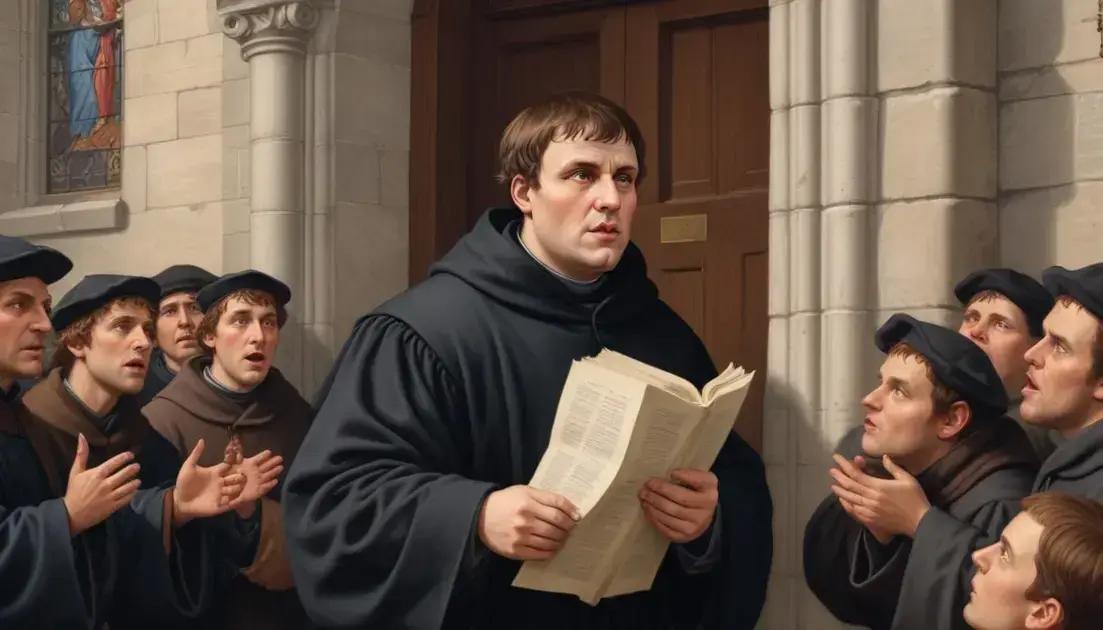
Luther’s Reformation: Break with the Catholic Church
The Reformation was a pivotal movement that transformed Christianity and European society. Initiated by Martin Luther in 1517, it challenged the Catholic Church, leading to religious diversity with new denominations like Lutheranism and Calvinism. The emphasis on personal faith and direct Bible access increased literacy and education. Politically, it reshaped power dynamics, allowing rulers to assert independence from papal authority. The legacy of the Reformation still influences modern views on religious freedom and diversity, highlighting the importance of individual beliefs in today’s society.
The Reformation marked a pivotal moment in history when Martin Luther challenged the very foundations of the Catholic Church. Did you know that this movement not only changed the church but reshaped Europe entirely?
The Catalyst: Martin Luther’s 95 Theses
In 1517, Martin Luther took a bold step that changed everything for Christianity. He nailed his 95 Theses to the church door in Wittenberg. This act was much more than just a list of complaints; it was a call for change.
What Were the 95 Theses?
Luther’s 95 Theses criticized the Catholic Church, particularly its practice of selling indulgences. Indulgences were payments that people thought could reduce their time in purgatory. Luther believed this was wrong and that faith, not money, mattered most.
The Reaction
When news of the theses spread, it sparked debate across Europe. Many people began to question the church’s authority. Some supported Luther, while others defended the church. The reaction was intense, leading to both support and resistance.
Spread of Reformation Ideas
Thanks to the newly invented printing press, Luther’s ideas spread quickly. Pamphlets and translations of his work went far and wide. This helped the word get out, even to those who couldn’t read Latin.
A Turning Point
Luther’s challenge wasn’t just about church practices; it was a major turning point for Christianity. It opened up discussions about faith, salvation, and individual beliefs. People started thinking for themselves and seeking personal connections with God.
Ultimately, Luther’s actions led to the formation of new Christian denominations and forever changed the course of history. His 95 Theses are still seen as a crucial moment in the history of Christianity and the Reformation.
The Response of the Catholic Church
The response of the Catholic Church to Martin Luther was swift and intense. At first, church leaders dismissed his 95 Theses as nonsense. But as Luther gained followers, they grew concerned. They didn’t want to lose their influence over the faithful.
Papal Bull of 1520
In 1520, Pope Leo X issued a document known as a papal bull. This stated that Luther was a heretic and commanded him to recant his statements. Luther, however, refused to back down. He believed he was standing for truth.
Excommunication
As a result of his refusal, the Church excommunicated Luther in 1521. This meant he was cut off from the Church and its community. It was a serious punishment. But instead of silencing him, it made him more popular among his supporters.
The Diet of Worms
In the same year, Luther was called to the Diet of Worms, a significant assembly. Here, he was asked to recant again. Luther stood firm, famously stating, “Here I stand, I can do no other.” His courage inspired many and showed the Church he wouldn’t easily be swayed.
Counter-Reformation
In response to Martin Luther’s challenges, the Catholic Church launched the Counter-Reformation. This was an effort to reform the Church from within. They aimed to address some issues that Luther raised, but they also sought to strengthen their authority.
This movement included new orders, like the Jesuits, who focused on education and missionary work. The Church also held the Council of Trent to clarify its teachings.
Impact on Christianity and Europe
The impact on Christianity and Europe from Martin Luther’s actions was massive. His challenge to the Catholic Church led to significant changes. Instead of one Catholic Church, many new denominations emerged. This meant people had more choices about how they practiced their faith.
Shift in Beliefs
Luther’s ideas encouraged people to read the Bible for themselves. This put a focus on personal faith and understanding. Many began to interpret scripture in ways that differed from church teachings. As a result, faith became more personal and less about rituals.
Rise of Protestantism
Protestantism grew rapidly after Luther’s theses. His followers formed various groups, such as Lutherans and Calvinists. These groups often disagreed among themselves but shared a common goal: to reform Christianity away from the Catholic Church.
Political Consequences
The Reformation also had political effects. Many rulers supported Luther to gain more power against the Church. Some saw this as a chance to assert their independence. Others embraced these new ideas to attract followers and strengthen their kingdoms.
Religious Conflicts
As different branches of Christianity took hold, conflicts arose. Wars, such as the Thirty Years’ War, broke out across Europe. These conflicts were about both religion and power. They showed how deeply the Reformation affected society.
Enduring Legacy
Today, Luther’s influence is still seen. The Reformation led to the modern understanding of religious freedom and diversity. It reshaped not just Christianity, but the whole of European culture and politics. The questions raised during this time continue to matter in discussions about faith and governance.
Legacy of the Reformation
The legacy of the Reformation is profound and far-reaching. It changed not just religion but also how society operates today. One key impact was the rise of religious freedom. Many people began to question authority and seek their own beliefs.
New Denominations
Before the Reformation, Catholicism was dominant. Afterward, many denominations emerged, including Lutheranism and Calvinism. Each group had unique beliefs and practices. This diversity allowed individuals to choose a faith that resonated with them.
Education and Literacy
The Reformation also stressed the importance of education. Reformers believed people should read the Bible themselves. This led to a push for literacy in many cultures. Schools were established, making education more accessible to the public.
Influence on Politics
Politically, the Reformation shook up the balance of power. Kings and princes saw an opportunity to gain more control over their nations. They often used the Reformation to assert independence from the Pope and the Church.
Social Changes
Socially, the Reformation encouraged people to think critically about their beliefs. It sparked discussions about morality, governance, and personal rights. These discussions laid the groundwork for modern democratic ideals.
Enduring Impact
Today, we still feel the Reformation’s effects. Many countries celebrate cultural and religious diversity. The idea that everyone has the right to their own beliefs is widely accepted. The Reformation transformed not just Christianity but also how societies view faith today.
Conclusion
In conclusion, the Reformation was a major turning point in history that reshaped Christianity and society as a whole. It led to new denominations and greater religious freedom, allowing individuals to explore their faith without fear of persecution. The emphasis on education sparked a rise in literacy, giving more people access to knowledge and personal understanding.
The political and social changes following the Reformation encouraged critical thinking and personal rights. Today, we still see the effects of these changes. Acceptance of diverse beliefs and the value of each person’s opinion continue to be important in our society. Understanding the legacy of the Reformation helps us appreciate the freedoms we enjoy today.


